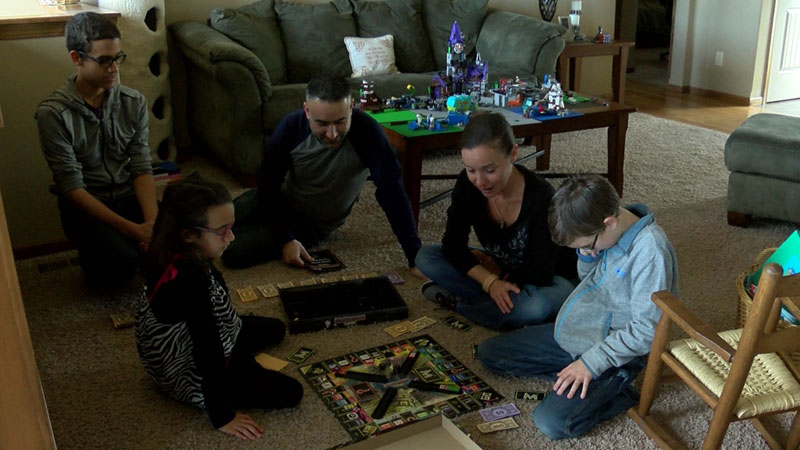WICHITA, Kansas – How long could you go unplugged from technology? For years, psychologists have pointed to technology being available at our fingertips as a major factor pulling us away from true communication—our connection to our screens is keeping us closed off from others.
“Almost any person right in front of you or anything happening in real life right around you is not as enticing as that screen,” says psychologist Molly Allen, “but that screen is not your whole life. This is your life out here.”

We put the Rivera family up to the challenge: unplugging for an entire weekend. Most studies point to teenagers as being extra dependent on their cellphones. According to a 2010 study by Pew Research Center, 72% of those ages 12-17 receive 50 or more text messages a day, or 1,500 a month—31% of teens receive more than 100 messages per day, clocking more than 3,000 text messages a month. Even with those numbers,14-year-old Jace Rivera was unfazed, “I think it’ll be alright. It’s just a weekend. I’ll be seeing all of [my friends], it won’t be too difficult.” However, his father Eddie had a very different reaction. “I don’t function without it,” he said with a smile, “I don’t feel like I function without it…although that shouldn’t be true. It’s the first thing I do probably when I wake up.”
Pam Rivera is less attached to her phone, Eddie says jokingly that she probably won’t notice it being gone too much for using it in her spare time, she agreed. “Sometimes, our lives are so full and fun that there’s not always a need to have technology to make our day better,” she said. She did later note that the main functions she would miss would be primarily for communication and transportation, “what if something bad happens? Who can I get in contact with?”
While the younger children in the house, Jordan and Jodee, ages 11 and 8 respectively, aren’t concerned about the cellphones and iPads being gone for the weekend. They both expressed happiness at being able to really interact with their family. “It’s going to be fun to play with everyone,” said Jodee. “I’m going to be able to be with my dad and play with my brother. Everyone won’t have any distractions.” Jordan agreed, noting, “On Sunday, my dad always gets on his phone and I don’t get to spend time with him, but now I will!”
“I think as a dad, you don’t realize. You think that you’re immersed in their lives and from their perspective, it’s not always that way.” — Eddie Rivera.
Allen says the reactions aren’t surprising. “We’ve, in a way, given ourselves the illusion that we’re more connected than we used to be, when in fact, we’re not. We simply have leashes on each other.” She encourages families to work on being present and knowing when to put the phone down, “I’ve seen entire families all on their cellphones and not actually speaking to one another. So it is important to have some boundaries and guidelines around.”
24 hours into the experiment, we checked back in with the family. Aside from some expected communication issues, things have been running smoothly, with the family even engaging in more conversations than usual. “I had a lot of conversations with my wife this morning and yesterday night, so that was good,” said Eddie. “You know, usually when we wind down for the night we kind of go off into our own separate corners and do our thing. It was nice to talk and, you know, reflect.”
But the experiment wasn’t over yet, they still had another 24 hours to go.
When we arrived Sunday afternoon, the family was preparing for a Sunday lunch. While the family says this isn’t out of the ordinary, taking away the phones offered the opportunity to really connect.

Once lunch was over, devices were returned and we asked the family how the experiment went. Overall, things went well, “I think it was okay, I did alright,” said Jace, “I mean I would much rather have a phone to communicate with people, but I think I did alright.”
The big question though: will anything change? According to Eddie, the answer is yes. “The kids themselves taught me a lot through this, you know, even now, talking about getting it back, the kids are like ‘you don’t get it back until tomorrow dad!’ so I mean, there’s something there, something I need to pay attention to and really take home.”
So when is the appropriate time to give cellphones to your children? Psychologists say it varies from family to family but they do lay out a few ideas for ground rules.
- Establish rules for the phones before giving them to your child.
- Set boundaries in the home for places where phones can be used and set time aside when phones shouldn’t be used.
- Ensure that parents are following the same rules that the children are.
Pew Research Center Study: Teens and Mobile Phones



